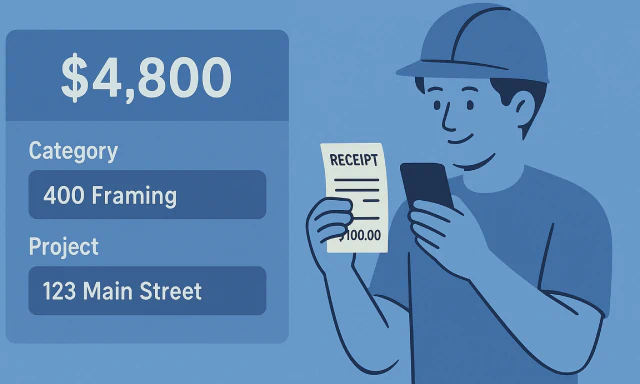Proper construction expense management is essential for keeping projects profitable. Receipts, invoices, and expenses across multiple job sites can stack up quickly, and without a clear system, tracking them accurately becomes a constant struggle.
This guide shares practical systems to track, categorize, and control every dollar, helping you protect profits and make confident business decisions.
Why Construction Expense Management Is Uniquely Challenging
Construction teams face extra hurdles in managing expenses. Crews make frequent on-the-go purchases for materials, fuel, and tools, often with cash or company cards. Receipts can be lost or damaged, and every cost must still be assigned to the right project, phase, and category for accurate job costing.
Manual methods and basic accounting software rarely keep up, leading to blind spots in financial data that affect profitability and cash flow.
The Cost of Poor Construction Expense Management
Poor construction expense management directly impacts your bottom line and business operations:
- Reduced Profitability: Incomplete or misallocated expenses make it hard to know which projects are truly profitable, leading to underbidding and lost revenue.
- Tax and Compliance Risks: Disorganized records increase the risk of missed deductions and audit issues.
- Cash Flow Strain: Delayed expense processing ties up working capital and can frustrate employees waiting for reimbursement.
By maintaining accurate, organized expense data, you protect profits, improve pricing decisions, and keep cash flow healthy.
8 Best Practices for Construction Expense Management
Here’s a simple checklist of practical strategies to improve accuracy, efficiency, and profitability:
- Capture Receipts on the Spot Use mobile apps or tools to record expenses immediately, ensuring receipts don’t get lost or damaged.
- Standardize Cost Codes Consistent categorization across projects enables meaningful analysis and early identification of cost overruns. Train your team to use the same codes for similar expenses.
- Set Clear Approval Policies Require approval for expenses above set thresholds. Digital workflows create accountability and prevent budget overruns.
- Tie Expenses to Jobs and Phases Assign every expense to the correct project and cost category. This improves job costing, future estimates, and profitability insights.
- Automate Routine Expenses Schedule recurring payments like equipment rentals, insurance, and utilities to reduce manual work and prevent errors.
- Monitor Expenses in Real Time Track spending as it happens to spot issues early and keep budgets on target.
- Control Petty Cash Implement clear policies and limits for cash purchases. Require receipts for all petty cash transactions to prevent misuse.
- Review and Reconcile Regularly Check expenses weekly or bi-weekly to catch errors early and maintain reliable financial data.
Technology Solutions That Improve Construction Expense Management
Modern tools make tracking construction expenses faster, more accurate, and fully connected to your project budgets. Solutions like mobile receipt capture, automated categorization, and integrated reporting reduce manual work and help teams see real-time project costs.
Mobile Receipt Capture & Expense Tracking
Mobile apps let field teams record purchases instantly, even offline, with GPS tagging and photo timestamps for better documentation. Expenses sync directly to project accounting, cutting down on lost receipts and manual entry.
Smart Categorization & Automation
AI-powered tools can read receipt details, suggest cost codes, and learn from past expenses to improve accuracy over time. Automation of recurring costs saves time and keeps data consistent.
Integration with Job Costing & Financial Systems
Connecting expense tracking to project budgets and accounting systems eliminates double entry and provides real-time visibility into profitability.
The Beam Advantage
Beam offers a platform that combines mobile receipt capture, automated expense tracking, and integrated job costing in one system. Teams can assign physical or virtual cards with spending limits, track expenses instantly, and sync everything to accounting, making financial data more accurate and easier to manage.
Building an Expense Management Culture
Effective construction expense management starts with habits, not just tools:
- Train Teams on Procedures: Clear training on expense policies ensures everyone follows the same process. Regular refreshers keep teams up to date as procedures evolve.
- Make Tracking Easy: Simple, user-friendly tools increase adoption and compliance. Processes should fit naturally into field workflows rather than create extra work.
- Provide Feedback and Recognition: Highlight good expense management practices and share project financial data. This builds accountability and helps teams see the impact of accurate tracking.
- Lead by Example: Managers set the tone by following expense procedures themselves. Consistent leadership demonstrates that expense management is a core business priority.
Turn Expense Management into Profit Protection
Effective construction expense management is one of the most direct ways to protect profits. Contractors who track expenses accurately gain better cost control, more precise pricing, and a clearer view of project performance.
Good practices provide insights into which projects, activities, and approaches are most successful, helping you make smarter decisions about future work and growth.
With the right systems and habits, expense management doesn’t have to be complicated. You can capture every expense, understand true project costs, and use that information to run more profitable projects.
Ready to see how integrated construction expense management can improve accuracy and visibility? Schedule a demo today.


